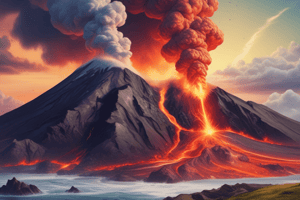Podcast
Questions and Answers
What are some common hazards associated with volcanic eruptions?
What are some common hazards associated with volcanic eruptions?
- Hurricanes and tsunamis
- Lahars, lava flows, and pyroclastic flows (correct)
- Earthquakes and tornadoes
- Blizzards and hailstorms
How can individuals prepare for a volcanic eruption in terms of reducing risks?
How can individuals prepare for a volcanic eruption in terms of reducing risks?
- Avoid storing clean water and food
- Drive as fast as possible during ash fall
- Wear protective gear like goggles and masks (correct)
- Remain in buildings with low-pitched roofs during heavy ash fall
What should individuals do if they receive a warning prior to ash fall during a volcanic eruption?
What should individuals do if they receive a warning prior to ash fall during a volcanic eruption?
- Ignore the warning and continue with their daily activities
- Drive to a location with better visibility
- Leave work or school and shelter in place (correct)
- Remain in buildings with flat roofs
Which of the following is NOT a recommended action to take to prepare for a volcanic eruption?
Which of the following is NOT a recommended action to take to prepare for a volcanic eruption?
What is one essential step in preparing for a volcanic eruption to protect your home?
What is one essential step in preparing for a volcanic eruption to protect your home?
How can individuals identify secondary hazards related to volcanic eruptions?
How can individuals identify secondary hazards related to volcanic eruptions?
What is the main cause of volcanic eruptions?
What is the main cause of volcanic eruptions?
Which type of volcanic eruption is characteristic of Hawaiian volcanoes?
Which type of volcanic eruption is characteristic of Hawaiian volcanoes?
What are the common signals that may indicate an impending volcanic eruption?
What are the common signals that may indicate an impending volcanic eruption?
In more violent volcanic eruptions, what happens to the magma being expelled?
In more violent volcanic eruptions, what happens to the magma being expelled?
Where did a destructive volcanic eruption occur in 79 CE that affected Pompeii?
Where did a destructive volcanic eruption occur in 79 CE that affected Pompeii?
What characterizes volcanic eruptions that involve hollowing out the magma conduit with an explosive blast?
What characterizes volcanic eruptions that involve hollowing out the magma conduit with an explosive blast?
Flashcards are hidden until you start studying
Study Notes
Volcanic Eruptions
Volcanic eruptions are the explosive and non-explosive expulsion of gas, magma, and volcanic ash from a volcano. They can be the result of heat moving beneath Earth's surface and the accumulation of gas-rich magma near the surface. Eruptions can range from gentle outflows of lava, as seen in Hawaiian volcanoes, to massive and destructive events, like the eruption of Vesuvius that destroyed Pompeii in 79 CE.
How Volcanoes Erupt
Volcanic eruptions often begin with the accumulation of gas-rich magma in reservoirs near the surface. However, they may also be preceded by emissions of steam and gas from small vents in the ground. Small earthquakes, which can be caused by a rising plug of dense, viscous magma oscillating against a sheath of more permeable magma, may signal an eruption.
In some cases, magma rises to the surface as a thin and fluid lava. This can either flow out continuously or shoot straight up in glowing fountains or curtains. The eruptions of Hawaii's volcanoes fall into this category. In more violent eruptions, entrapped gases tear the magma into shreds, and viscous clots of lava are hurled into the air. In even more explosive eruptions, the magma conduit is hollowed out by an explosive blast, and solid fragments are ejected in a great cloud of ash-laden gas that rises tens of thousands of meters into the air.
Volcanic Hazards
Volcanic eruptions can pose several hazards. These include volcanic ash, gases, lahars (mud flows), landslides, lava flows, and pyroclastic flows (fast-moving currents of hot gas). These hazards can be deadly and often cause population displacement and food shortages.
Preparing for Volcanic Eruptions
To prepare for a volcanic eruption, it is essential to assess and plan. Learn your volcano risks and warning signs, and be aware of secondary hazards such as landslides and lahars. Participate in early warning systems and develop plans for both evacuating and sheltering in place.
Additionally, reduce risks by protecting your home from volcanic ash and covering water sources if time allows. Avoid driving during and after ash fall when visibility can be very low and roads are slippery. Protect your lungs and eyes by wearing protective gear such as goggles and masks.
Finally, prepare to respond. Follow official instructions from local authorities on whether to evacuate or take shelter. If you get warning prior to ash fall, return home from school or work and shelter in place. If the ash fall is heavy, do not remain in a building that has a low-pitched or flat roof.
Do's and Don'ts
- Assess and plan
- Learn your volcano risks and warning signs
- Become familiar with volcano hazard maps and danger zones
- Participate in early warning systems
- Be aware of secondary risks such as landslides and flash floods
- Avoid driving during and after ash fall
- Support vulnerable people to evacuate or shelter in place safely
- Store clean water and food
- Protect your eyes and lungs with goggles and masks
- Prepare and practice evacuating or sheltering in place
Classification of Volcanic Eruptions
Volcanic eruptions can be classified by the manner in which they erupt. These six types of volcanic eruptions, starting with the least explosive, make up one classification system: Icelandic, Hawaiian, Strombolian, Vulcanian, Pelean, and Plinian. Each name corresponds to a region or to a specific volcano or historical eruption that exemplifies the type.
Studying That Suits You
Use AI to generate personalized quizzes and flashcards to suit your learning preferences.




